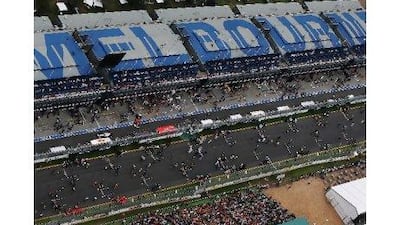Far removed from Formula One's European epicentre, the Australian Grand Prix in Melbourne has almost always sat somewhat uncomfortably on the F1 calendar.
Be it the problematic time-zone hurting television viewing figures, protests from the public over the move from Adelaide to Albert Park or dwindling attendances in the stands, Australia has never been the favourite race of Bernie Ecclestone, the F1 chief.
Recent comments from Ecclestone in retaliation to an open letter from Melbourne Lord Mayor Robert Doyle would suggest the Australian Grand Prix is ready to make way when the race's contract expires in 2015.
Yet, with the postponement of the Bahrain Grand Prix resulting in Melbourne becoming the de facto season-opener - a privilege the Gulf state had previously paid tens of millions of additional dirhams for - race officials may soon experience a change of heart.
Andrew Westacott, the newly appointed chief executive of the Australian Grand Prix Corporation (AGPC), which is charged with facilitating the holding of motorsports events in the country, said it was impossible to imagine the Melbourne race would not benefit.
"We'll have the eyes of the Formula One world and the sporting world on us," Westacott said. "And without the race in Bahrain, potentially the teams will spend more time in Melbourne after final testing in Barcelona."
Doyle, writing in the SundayHerald Sun earlier this month, had said the annual race no longer represented value for money to the Victorian state taxpayer.
"In 1996 when the race was a combination of a four-day event and corporate sponsorship was far more generous than it is today, the race still needed to be underwritten by about A$1.7 million (Dh6.26m)," Doyle wrote. "Last year it was A$50 million."
The city mayor, who was elected in December 2008, also labelled Ecclestone "notoriously difficult, contentious and cranky," and suggested one outcome for the Melbourne race would see the F1 rights-holder "pick up his bat and ball" and "take the dollars of either an Asian or oil-rich Middle Eastern state".
Ecclestone, who had earlier said "we don't need Australia", retorted: "I haven't dealt with this mayor, we've had a few of them, so I don't know which one is which [but] I [think] I will be dealing with these things longer than he is going to be mayor of Melbourne."
The Herald Sun yesterday claimed seven of Doyle's eight Melbourne councillors are in favour of the race remaining on the F1 calendar.
"I want it to be here as long as possible," the newspaper quoted councillor Carl Jetter as saying. Jetter's colleague Kevin Louey is quoted as having agreed that F1 is "unlike other sporting events" and "it enhances Melbourne's name".
The Australian Grand Prix has experienced a dwindling of television viewership figures in recent years, which has seen the event gradually develop into a twilight race in a bid to nullify the impact the city's GMT+11 time zone has on European television audiences.
In 2007, the race was held at 2pm local time, before moving to 3.30pm in 2008. By 2009 it was 4pm and last year it was delayed an hour once again. This year's race, which takes place on March 27, will start at 5pm, despite drivers having expressed concerns over the issue of fading light for the past two years.
Ron Walker, the chairman of the AGPC, said the race will now achieve an even larger international television audience, however, courtesy of Bahrain's withdrawal. He also said the postponement of the Kingdom's race could result in more ticket sales for Albert Park.
"Good for our branding, that goes throughout Asia at midday to China, Russia and India," Walker told the Australian Broadcasting Corporation yesterday.
"We'll have an increased audience throughout Europe and that's great for our brand Melbourne, it's great for tourism, it's great for the city of Melbourne." Westacott said the race is expected to attract 23,000 visitors to the city and could "take up 70,000 hotel nights".

